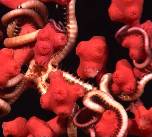Usibelli Coal Mine Inc., owner of an open-pit coal mine near Healy in Alaska’s central interior, has signed a consent agreement and final order that resolves water permit violations and numerous unpermitted discharges.

Examination of murre eggs from the northernmost nesting areas where sea ice exists all year long revealed lower amounts of mercury isotopes than in eggs collected from sites in southern Alaska where there is no ice cover.
Approximately one in four Montrealers take some kind of anti-depressant, and according to new research, the drugs are passing into the waterways and affecting fish.
Twenty-nine legislators supported bills in the House and Senate that would remove some authority from the Department of Ecology and set up a new water commission.
The agency has funding available to support demonstration; pre-proposals are due by March 8.

Five areas are threatened by impacts related to energy production, from offshore drilling in Alabama to mountaintop removal coal mining in Tennessee to 'fracking' in Virginia.
The free webcast on "Nitrogen and Phosphorus Pollution and Harmful Algal Blooms in Lakes” is scheduled for Jan. 26.

Increased monitoring ability will enable better monitoring of plants' response to different environments.
EPA will use its authority under the Clean Water Act to halt the proposed disposal of mining waste in streams at the Mingo-Logan Coal Company’s Spruce No. 1 coal mine.
Compounds from the decay of organic matter in aquatic settings affect mercury cycling, according to a paper in the journal Proceedings of the National Academy of Sciences.
Clean Water America Alliance meets with other stakeholders today for dialogue on greater sustainability and stronger science.
Researchers from the University of Washington say the Mariana crow, a forest crow living on Rota Island in the western Pacific Ocean, will go extinct in 75 years, almost twice as soon as previously believed.
The European Union's energy commissioner, meanwhile, is watching the U.S. actions and will propose his own legislation soon.
The U.S. Army Corps of Engineers is soliciting public comments on the updated draft National Wetland Plant List developed as part of an ongoing interagency effort to identify and assign wetland plant ratings to species found in the United States and its territories.
The amount of dust in the Earth’s atmosphere has doubled since the beginning of the 20th century and the dramatic increase is influencing climate and ecology around the world.

New evidence suggests that the bulk of the world’s fisheries – including small-scale, often non-industrialized fisheries on which millions of people depend for food – could be sustained using community-based co-management.
Billfish and tuna, important commercial and recreational fish species, may be more vulnerable to fishing pressure because of shrinking habitat according to a new study.
Virtual library includes closure maps, wildlife reports, and mission logs by crew members.
A new methodology to assess the potential to store carbon in U.S. wetlands, forests, and rangelands ecosystems – and thus to reduce emissions of greenhouse gases to the atmosphere — will help find ways to mitigate the impacts of climate change.

New submarine volcanoes, a large hydrothermal field with a thriving exotic animal ecosystem, and areas rich with deep-sea ocean animals are among the discoveries they reported.